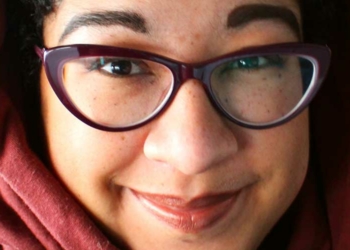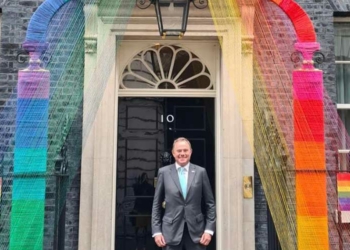Like many Strictly Come Dancing fans, I watched the Strictly final and was swept along with the high emotion of the evening. Two couples, Rose Ayling-Ellis and Giovanni Pernice, and John Whaite and Johannes Radebe both came to the final with a strong theme of representing a community; Rose because she is deaf, and John and Johannes because they were the first couple on Strictly made up of two men.
I think it was entirely right that Rose and Giovanni won, because even though both couples were pioneering in their way, Rose not only has what some might view as a disability, but, together with Giovanni, innovated throughout the series and shone brightly through it.
But something struck me about John and Johannes that crystallised for me why their partnership mattered, whether they won or not.
I watched the final with a straight man I know. He’s someone brought up in a church setting who will be the first to admit he still has to work on ingrained prejudices. Personally, I am not a huge fan of the rumba when danced by anyone, but my friend doesn’t share my discomfort about it. However, I was very touched by his reaction to the first dance John and Johannes did during the final, which he hadn’t seen when they had danced it earlier in the series. He said it was really affecting and stirring, in exactly the same way a rumba between a man and a woman would have been, and he really enjoyed it.
Now, I know there have been discussions about the specific worth of two gay men dancing together. I get those questions – it’s not a dating show, so the sexual orientation of the couples is irrelevant. But it does feel right to me that two gay men are the ones who make such a big step forward, because us homosexuals are the ones who live in a world where it is still a double take for many to see two men or two women romantically together, and who will primarily benefit from the shift in perspective.
Part of shifting that window of what is ‘usual’ is by seeing same sex partnerships in settings where the chemistry has traditionally been based on heterosexual norms. There need be no romance involved. That’s what ‘visibility’ means in this context. Two straight men dancing together will eventually have a similar destigmatization, but shifting more general cultural norms of masculinity is only part of this story.
The conversations on screen in the vox pops and VTs were very much focused on the young LGB people watching two openly gay men dancing together, and feeling represented. I understood why and wholeheartedly agreed. I even shed more than one tear (OK, I sobbed like a child throughout the final).
We can say until we are blue in the face that we are as ‘Good As You’, but that longer term, hard work of shifting a cultural perception goes beyond marches and legal rights. It’s not done in a confrontational equality training programme.
However, I think that the most powerful effect of this kind of representation is much wider than how it feels for lesbian, gay and bisexual people to feel seen in every sphere that heterosexuals do.
LGB people have been well used to fighting for our rights and equality. We know what it means to stand up and be brave pioneers. But change requires more than just us standing up. It requires the rest of society to change as we do.
What was so thrilling to me about John and Johannes wasn’t just that they danced powerfully and well, earning their place in the final. It was that everyone knew they earned it. They were there because they were good enough, not because they were tokens, and my straight male friend’s reaction to the rumba was a great illustration of how that baseline then leads to deeper acceptance.
He sat with me afterwards and unpacked his response, and how he had felt the sensuality of the dance, understood the performance of passion and the affection between the two men. He said it was fascinating to him to realise he felt as connected emotionally to it as he did when heterosexual couples danced with that level of intimate sensuality.
You cannot underestimate how powerful this is. Most people I know who have moved from an initial position of casual, unthinking, conditioned homophobia have done so because they developed friendships with LGB people, or they saw a sympathetic depiction of a homosexual couple, and it challenged their prejudices.
As I’ve mentioned, a truly equal society would have two men or two women, or a man and woman together and their sexuality be of no consequence. But that’s not quite the situation yet. We still live in the society where the mere sight of two men holding hands is portrayed by some as ‘shoving it down our throats’. For that to change, a major step is completely destigmatizing homosexuality.
We can say until we are blue in the face that we are as ‘Good As You’, but that longer term, hard work of shifting a cultural perception goes beyond marches and legal rights. It’s not done in a confrontational equality training programme. It goes right into the heart of Saturday night prime time, and a straight man understanding, in a way that can only be felt, not taught, that same sex love and sensuality can be something genuinely beautiful, just as opposite sex love can be.
Once that straight man sees the beauty in two men being intimate in the same way as the intimacy he may share with his girlfriend, the fear of intimacy with other men begins to die out, which will enrich his life, and as a consequence, the lives of all LGB people who already know who we love. For all my cynicism about slogans, if ‘love is love’ means anything, it means an end to lesbian and gay love being some sort of exotic ‘other’.
I am delighted John and Johannes did as well as they did, for the sake of all the LGB people who saw them do it. But I know it was the heterosexuals who saw them, loved them, and were moved by them, who will be the ones standing in the bus queue, the office and the factory openly shedding their prejudices and moving a culture towards the equality we all want. This is how homophobia dies: by the joyous celebration of human intimacy, whatever the sex of the partners.
Kay Knight is a British writer and podcaster. She has a particular focus on women’s stories, and an enduring fondness for Doctor Who, despite everything.
Photo: BBC
























Comments
No comments yet, be the first to leave a comment.